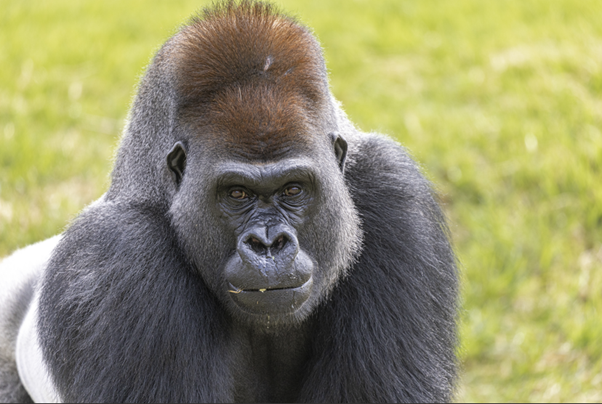In recent years, videos of gorillas showing their distaste for rain have attracted millions of views on YouTube. However, the spread of these videos has created an impression among viewers that gorillas, at least once they leave rainforests, are united in their opinion of the wet stuff falling from the sky. Now, another video shows how wrong that is, and it might become part of one gorilla’s dating profile.
There’s plenty to love in the rain-fearing gorilla videos, from their expressive faces, so like our own, to the way some mothers try to shield juveniles. There’s also the irony of creatures who diverged from humans partly because we chose the savannah while they stayed in the rainforests, seeming so keen on keeping dry. Setting them to music helps, too.
A video from Werribee Open Range Zoo in Melbourne, Australia, reveals something different – how wide a gap there can be in tastes within a species, and indeed even between siblings.
We know he’s really enjoying it when his toes are curled up in the air too.
Kristina Sleeth, keeper
The video shows 25-year-old Western lowland gorilla (Gorilla gorilla gorilla) Ganyeka playing on wet grass while it drizzled. “We see him rolling around on his back, rubbing the water in his hair and getting it down his shoulders,” keeper Kristina Sleeth said in a statement sent to IFLScience. “We know he’s really enjoying it when his toes are curled up in the air too.”
We can’t see it, but Ganyeka’s brother Yankini’s response was very different.
“Ganyeka enjoys the rain, and we think that when the grass is really wet and damp that the cool water must feel really nice on his back and arms,” Sleeth said. “Meantime, his brother Yakini will be the first gorilla to run under a shelter when it rains to hide away.”
Keeper Laura Hickleton told IFLScience that while rain is an everyday experience for gorillas in their native habitat, “We typically see that gorillas in captivity don’t like to be in rain. They get used to their heated areas.”
However, she added, “When the other gorillas are huddled away in sheltered areas, it’s an opportunity for Ganyeka to have the habitat all to himself. It’s just like if you were home alone and you could do whatever you wanted – it’s exciting and he can really just let loose.”
Intriguingly, Ganyeka seems to be a bit shy about his unusual preferences, only playing in it when he doesn’t think anyone is watching. Apparently, he doesn’t know about hidden cameras.
Ganyeka has that ‘little brother’ energy and has a really funny personality. He likes to annoy his brother by waking him up, stealing his food, and pounding on structures in the habitat to get a reaction out of him.
Laura Hickleton
Ganyeka and Yankini are two-thirds of the zoo’s bachelor group, along with the retired Motaba. As young silverbacks, they are no doubt keen to lead a family troop and father children for the critically endangered subspecies.
In the wild, that would mean challenging a reigning patriarch to a battle, but Hickleton explained in captivity, it means being selected by matchmaking keepers at another zoo as the best fit for their females. Like other captive males, Hickleton explained that Ganyeka and Yankini have a dating profile for gorilla keepers to assess. These record their genetics to prevent inbreeding with close relatives, but Hickleton told IFLScience that behavior is also important.
“Even with ideal genetics, a match may hate each other,” Hickleton said. There’s a sitcom in that.
“Ganyeka has that ‘little brother’ energy and has a really funny personality. He likes to annoy his brother by waking him up, stealing his food, and pounding on structures in the habitat to get a reaction out of him,” Sleeth noted. “But he is also very sweet, sensitive, gentle, smart, and curious. He keeps us on our toes all the time.”

Surely there is a family of gorillas that would love this playful, sensitive face.
Image credit: Werribee Open Range Zoo, Zoos Victoria
So does this mean that somewhere there’s a zoo keeper with rain-loving females flipping through silverback profiles and humming the song about liking Pina coladas and getting caught in the rain?
“They probably would not care about something as specific as enjoying the rain,” Hickleton said, “but Ganyeka’s general playfulness is very much a selling point.”
Perhaps the zoo should do a Ganyeka and Yankin comparison compilation for other keepers, but also ordinary primate fans. They could call it, “Gorillas in the midst of rain.”
Meanwhile, Ganyeka’s activities are an opportunity for Werribee to promote the “They’re Calling On You,” campaign they run with other Victoria zoos. The campaign promotes awareness of conflict minerals and asks people to recycle old phones and tablets through the zoo. The money raised from the sale of the phones’ metals provides medical care for wild members of the eastern lowland subspecies, who are threatened by mining operations encroaching on their territory.
Source Link: Adorable Video Proves Not All Gorillas Hate The Rain. It Might Even Win One A Mate